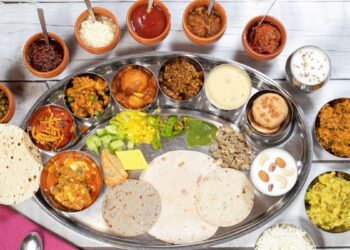BEST WISHES TO GHARUDA FOODS FROM

-Ayshwaria Lakshmi (cbedit@imaws.org)
Thanjavur-based Gharuda Foods has plans to expand its production capacity and move to a new 20,000 square feet factory by March 2024.
 In a conversation with Sivaraj Devarajan, Founder, of Gharuda Foods,” We started the brand, eight years ago, intending to bring authentic Thanjavur food to the world. We wanted to make cooking easy and healthy. We are moving from our 10,000 square feet factory to the new 25,000 square feet with processing units. In this factory, we are working towards complete automation.”
In a conversation with Sivaraj Devarajan, Founder, of Gharuda Foods,” We started the brand, eight years ago, intending to bring authentic Thanjavur food to the world. We wanted to make cooking easy and healthy. We are moving from our 10,000 square feet factory to the new 25,000 square feet with processing units. In this factory, we are working towards complete automation.”
Shivaraj shared that in March the factory would have 60 percent of its process automated. The aim, he added, is to bring in a no-touch concept in the production process. “At Gharuda’s, we promise to bring instant food to the customers without any preservatives, or colouring agents,” said Shivaraj. “We take our customer feedback seriously to give them healthy and convenient ready-to-eat food.”
Gharuda caters to B2B and B2C customers ranging from various parts of the country. Internationally, Gharuda’s Foods has clients in the United Kingdom, Singapore and Dubai and has plans to add more markets to its portfolio. Gharuda offers products in bulk for the Horeca segment. Its current offerings are more suited for the Horeca segment as it offers instant ready paste, ready mix, podi varieties, and millet varieties. Biriyani mixes are Gharuda’s best-selling products.
According to the company, these product offerings are futuristic products when it comes to B2C whereas for the B2B clients it suits their needs. Keeping its initial motive close to the heart, the company provides for all varieties of South Indian dishes which are rarely offered by other players in the markets. Gharuda aims to be a pioneer in the Ready-to-cook segment where the consumers would only have to add rice, vegetable or meats of their choice to prepare food. With one single product from Gharuda, the company says varieties of foods can be cooked.
Preserved foods
Earlier preserved foods were considered harmful to health. The growing demand for convenient and time-saving options led consumers to look for options with healthier and natural preservatives in preserved foods. The ready-to-mix food products in India’s growth was a response to pandemic-induced panic buying. Companies in this sector in India invest their time in innovation to meet consumer demands including the development of new flavours, healthier options, and products with longer shelf life.
Shivaraj shares that companies, these days, have understood that customers have new flavours but without additives. To sustain in the market, companies have to sell products free of adulteration. Shivaraj also highlights that companies should ensure that the raw materials procured are free of adulteration.
“We took research and development as a very important aspect of our business in the past eight years to bring instant food without preservatives to the shelves. The majority of our investment went towards research. Gharuda’s uses dehydration and UV radiation as a few of the methods to preserve foods,” Shivaraj said.
The only way to remove harmful contents from the food is by educating the farmers on cultivating with fewer chemicals and staff on procuring raw materials. He also added that it is important to check and test the raw materials procured for adulteration. Companies have a research and development lab for this purpose to ensure that adulteration-free products only reach the consumers.
Challenges
One of the biggest challenges Gharuda Foods faced was acceptance in the market. Shivaraj shared that it took the last eight years for customers to recognise the brand and accept it.
“The food industry is a very sensitive market. Every aspect makes a huge difference in attracting consumers,” said Shivaraj. “ Quality, consistency and reliability are the most important factors to succeed in this industry. Creating a brand takes time as well and entering the household shelves takes time. The trust of the customers can only be gained if the business upholds these factors.”

The next challenge for Shivaraj is pricing. India is a very price-sensitive market. This is a challenge, Shivaraj says, can only be overcome when the customer educates themselves about the product they buy. He says that before buying any food product, the customers should check the ingredients and not just the price.
A quality product would be costlier than the other available in the market. Shivaraj shared that when customers recognise the quality over price, the product would gain an irrevocable trust in the market. Gharuda’s has been gaining the customer’s trust slowly in the last years by offering them the best quality product. The final challenge for Gharuda Foods is marketing. A ready-to-eat product in India takes time to gain recognition in the market. While this may be a challenge now, Shivaraj says there is a huge market for ready-to-eat products in the future.
Market Competition
The need for simpler, easier and time-saving food options as a result of busy and fast-paced lifestyles contributed to the growth of the ready-to-eat market. According to Statista, Revenue in the Ready-to-Eat Meals market amounts to US$64.09bn in 2023 in India. The market is expected to grow annually by 9.91% (CAGR 2023-2028). “India is a huge market for ready-to-eat products. The market is big enough to accommodate more players for healthy and fair competition. This allows every player to offer their best product to the customer,” said Shivaraj.
BEST WISHES FROM








